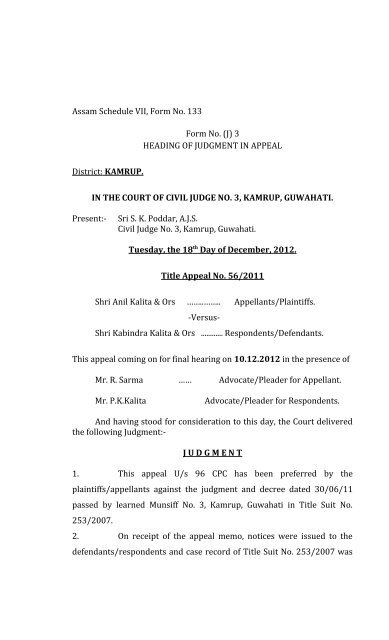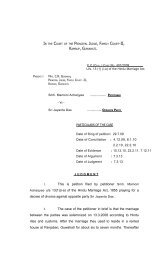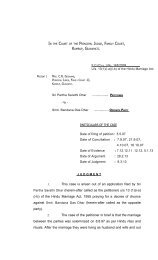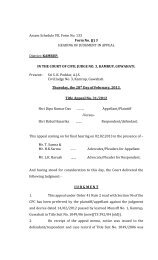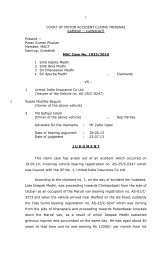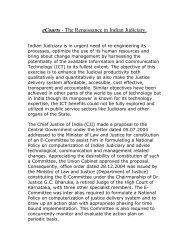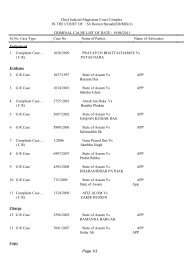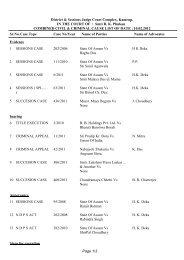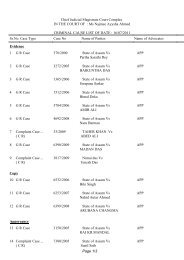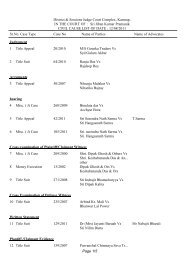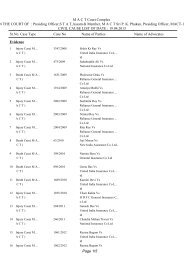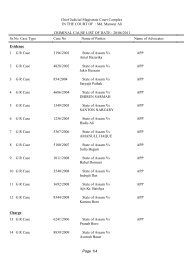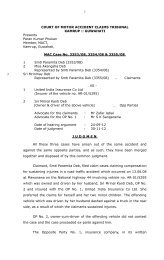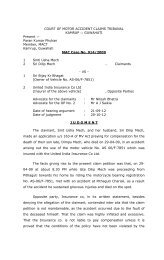Sri S. K. Poddar , Civil Judge & Asst. Sessions Judge No.3 - Kamrup
Sri S. K. Poddar , Civil Judge & Asst. Sessions Judge No.3 - Kamrup
Sri S. K. Poddar , Civil Judge & Asst. Sessions Judge No.3 - Kamrup
You also want an ePaper? Increase the reach of your titles
YUMPU automatically turns print PDFs into web optimized ePapers that Google loves.
Assam Schedule VII, Form No. 133<br />
District: KAMRUP.<br />
Form No. (J) 3<br />
HEADING OF JUDGMENT IN APPEAL<br />
IN THE COURT OF CIVIL JUDGE NO. 3, KAMRUP, GUWAHATI.<br />
Present:- <strong>Sri</strong> S. K. <strong>Poddar</strong>, A.J.S.<br />
<strong>Civil</strong> <strong>Judge</strong> No. 3, <strong>Kamrup</strong>, Guwahati.<br />
Tuesday,<br />
the 18th<br />
Day of December, 2012.<br />
Title Appeal No. 56/2011<br />
Shri Anil Kalita & Ors ……..…….. Appellants/Plaintiffs.<br />
-Versus-<br />
Shri Kabindra Kalita & Ors ............ Respondents/Defendants.<br />
This appeal coming on for final hearing on 10.12.2012 in the presence of<br />
Mr. R. Sarma …… Advocate/Pleader for Appellant.<br />
Mr. P.K.Kalita Advocate/Pleader for Respondents.<br />
And having stood for consideration to this day, the Court delivered<br />
the following Judgment:-<br />
J U D G M E N T<br />
1. This appeal U/s 96 CPC has been preferred by the<br />
plaintiffs/appellants against the judgment and decree dated 30/06/11<br />
passed by learned Munsiff No. 3, <strong>Kamrup</strong>, Guwahati in Title Suit No.<br />
253/2007.<br />
2. On receipt of the appeal memo, notices were issued to the<br />
defendants/respondents and case record of Title Suit No. 253/2007 was
Page 2 of 13 Title Appeal No. 56/2011<br />
called for. Respondents appeared through their engaged Advocate and<br />
contested the appeal. ……… Contd… at P/2<br />
3. I have heard learned advocate for both the sides, gone<br />
through the appeal memo and the case record of Title Suit No. 253/2007.<br />
4. The facts leading to the TS 253/2007, in brief, are that one<br />
Bashiram Kalita (since deceased) had three sons, namely Baroda Kalita<br />
(since deceased), Shri Mathura Kalita and Shri Kabin Kalita. The plaintiff<br />
are the leagl heirs of Late Baroda Kalita. The defendant No. 1 is the son of<br />
Late Bashiram Kalita. The proforma defendant Nos. 1 and 2 are the<br />
married daughter of Late Baroda Kalita. All the landed properties as well<br />
as properties acquired by Late Bashiram Kalita were divided equally<br />
among his three sons. The middle son of Late Bashiram Kalita namely<br />
Mathura Kalita separated himself from joint family status by executing<br />
deed of partition (Bibhagnama). After separation of Mathura Kalita, the<br />
remaining immovable properties remained joint etween Baroda Kalita<br />
and Kabin Kalita. Subsequently Baroda Kalita and Kabin Kalita executed a<br />
deed of partition (Bibhagnama Patra) dated 20/09/82 for partition of<br />
their joint property. According to this deed of partition, the properties as<br />
stated in Schedule-A were retained by Baroda Kalita, the predecessor-in-<br />
interest of the plaintiffs and Schedule-B land was retained by the<br />
defendant. Some of the properties were kept joint having common<br />
enjoyment and occupation thereof. After execution of the partition deed,<br />
the predecessor of the plaintiff and the defendant were enjoying and<br />
occupying the properties to the extent of their respective shares. It is<br />
further stated that a plot of land measuring 1 Bigha 3 Kathas 19 Lechas<br />
(suit land) was purchased jointly by the predecessor of the plaintiffs and<br />
the defendant No. 2 vide registered deed on 26/10/79 and the said land<br />
was given to Baroda Kalita as per partition deed dated 20/09/82 and<br />
after his death, the plaintiffs were enjoying the same without any<br />
disturbance and obstruction from the defendants till 30/03/02. On<br />
31/03/02, the defendant wrote a letter to the President/Secretary,<br />
Dakhin Janarpar, Sualkuchi for separation of the properties held jointly<br />
with the predecessor of the plaintiffs. The plaintiffs were informed that a
Page 3 of 13 Title Appeal No. 56/2011<br />
meeting of villagers will be held to discuss about the problem. The<br />
plaintiffs also informed the secretary that ……… Contd… at P/3<br />
properties in question were amicably and mutually settled and as a result<br />
no meeting of the villagers was held. It is also alleged that the defendant<br />
has no right, title and interest over the suit land as per the deed of<br />
partition dated 20/09/82. On the other hand, plaintiffs have acquired the<br />
right of prescription by virtue of continuous possession of more than 20<br />
years. The plaintiffs also alleged that the defendant sold the land in<br />
Darrang District though the land was jointly in the name of defendant and<br />
the predecessor of the plaintiffs. Hence, the plaintiffs prayed for<br />
declaration of right, title, interest of the plaintiffs over the suit land and<br />
also to issue permanent injunction restraining the defendant, his<br />
servants, agents etc. from entering into the suit land and also from<br />
causing any disturbance in the peaceful possession and enjoyment of the<br />
plaintiffs and the cost of the suit.<br />
5. The defendant No. 1 appeared and contested the suit by filing<br />
written statement stating inter-alia that there was no deed of partition<br />
dated 20/03/82 was executed between Baroda Kalita and the defendant<br />
No. 1. It is further stated that an agreement was entered into by Late<br />
Baroda Kalita and the defendant No. 1 sometime in 1981. The aforesaid<br />
agreement was entered into by the parties in presence of Shri Harmohan<br />
Kalita and Shri Bipin Kalita. The terms and conditions of the agreement<br />
were reduced in writing by Late Harmohan Kalita as per the dictation of<br />
Late Baroda Kalita. The above two persons namely Harmohan Kalita and<br />
Bipin Kalita put their signatures as witnesses. In the said agreement,<br />
Schedule-B land was allotted to the defendant No. 1. The said<br />
Bibhagnama was kept by Barada Kalita. As per the Bibhagnama, the basti<br />
land where Late Baroda Kalita and defendant No. 1 were residing was<br />
divided in equal shares. There is another plot of land measuring 10<br />
Lechas which was purchased out of joint fund over which a factory house<br />
is located under the name and style of M/S Anil Kalita and the factory<br />
house was allotted to the share of Late Baroda Kalita in lieu of the shop<br />
house located at Biswanath Chariali. With regard to the land measuring 9
Page 4 of 13 Title Appeal No. 56/2011<br />
Kathas (suit land), which is described by the plaintiffs as suit land, 5<br />
Kathas of land was allotted to the share of ……… Contd… at P/4<br />
Late Baroda Kalita and 4 Kathas of land was given to defendant No. 1.<br />
After such partition, both Baroda Kalita and the defendant No. 1 are<br />
enjoying their share of land peacefully. The defendant No. 1 further stated<br />
that the signature of the defendant No. 1 as appeared on the deed of<br />
partition dated 20/09/82 are forged signatures. It is stated that though<br />
the properties were partitioned as far back as in 1981, there was no<br />
demarcation in respect of the shares of Baroda Kalita and the defendant<br />
No. 1. The defendant No. 1 is residing at Biswanath Chariali and he is<br />
looking after the business there. The defendant No. 1 further stated in his<br />
written statement that out of the suit he claims only 4 Kathas of his share<br />
by giving 1 Katha more to the plaintiff. Hence, the defendant prayed to<br />
dismiss the suit with cost.<br />
6. On the above pleadings, both sides went on trial with<br />
following issues :-<br />
1. Whether the suit is bad for non-joinder of necessary parties?<br />
2. Whether the suit is barred by limitation?<br />
3. Whether two brothers namely Baroda Kalita and Kabindra<br />
Kalita executed a deed of partition (Bibhagnama Patra) dated<br />
20/09/82 for partition of their joint property?<br />
4. Whether the plaintiff is entitled to a declaration of right, title<br />
and interest in respect of the suit land?<br />
5. Whether the plaintiff is entitled to relief as prayed for in the<br />
plaint ?<br />
7. During trial, both sides adduced oral evidence and also proved<br />
some documents. After going through the evidence and hearing the<br />
arguments of both sides, Ld. Trial Court was pleased to dismiss the suit of<br />
the plaintiff.<br />
8. Against the above judgment and decree, the plaintiffs have<br />
preferred the instant appeal on the following amongst other grounds:-
Page 5 of 13 Title Appeal No. 56/2011<br />
a) That the Ld. Trial Court has based its findings on the<br />
misreading of evidence both oral and documentary and as such caused<br />
miscarriage of justice while passing the impugned judgment;<br />
……… Contd… at P/ 5<br />
b) That Ld. Trial Court has not discussed the evidence in proper<br />
perspective and also did not interpret the documents and thereby<br />
arrived at a perverse finding;<br />
c) That Ld. Trial Court has wrongly interpreted Section 101 of<br />
Evidence Act and unnecessarily placed the burden of proof upon the<br />
plaintiffs on the facts asserted by the defendant;<br />
d) That Ld. Trial Court has put unnecessary emphasis on the name<br />
of Kobin Kalita and Kabindra Kalita and passed wrong judgment;<br />
e) That Ld. Trial Court has failed to consider the Bibhagnama<br />
(deed of partition) in its true perspective;<br />
f) That Ld. Trial Court has failed to appreciate the undisputed<br />
fact of purchase of the suit land in the joint name of the predecessor of<br />
the plaintiffs and defendant No. 1;<br />
9. During appeal hearing, Ld. Advocate for the appellant has<br />
reiterated the grounds raised in the appeal memo. On the other hand, Ld.<br />
Advocate for the respondent/defendant has submitted that the decree<br />
passed is just and proper and needs no interference.<br />
POINT FOR DETERMINATION :-<br />
10. (i) Whether the judgment and decree passed by Ld. Trial Court is<br />
just and proper or needs any interference ?<br />
11. From the totality of the facts and upon hearing of the<br />
arguments I am of the opinion that issues have been framed properly and<br />
as such, I would like to re-appreciate the evidence based on issues framed<br />
by the Ld. Trial Court.<br />
12. Issue No. 1 :- This issue relates to non-joinder of necessary<br />
parties. The defendants in their WS have taken the plea that due to non-<br />
joinder of the other brothers, the suit is bad in law. On going through the<br />
pleadings of both sides, it appears that there is no dispute regarding<br />
partition of the paternal properties among three brothers whereby
Page 6 of 13 Title Appeal No. 56/2011<br />
Mathura Kalita has got himself separated in the year 1979. After that<br />
partition of family property, Barada Kalita, the predecessor of the plaintiff<br />
and the defendant No. 1 remained in joint family status and they<br />
purchased the suit property in joint name. ……… Contd… at P/6<br />
This suit is for the said plot of land measuring 1 Bigha 3 Kathas 19 Lechas<br />
purchased in the joint name and according to the claim of the plaintiffs,<br />
they have instituted the suit on the basis of a partition made in the year<br />
1982 in which the suit land was given in the share of the predecessor of<br />
the plaintiffs. In the suit land, except the plaintiffs and defendant No. 1, no<br />
other claimants are there and as such, no other party is required to join<br />
the suit for passing an effective decree. While deciding this issue, Ld. Trial<br />
Court has considered the above facts in proper perspective and arrived at<br />
a right conclusion by holding that the suit is not bad for non-joinder of<br />
necessary party. I concur with the findings.<br />
13. Issue No. 2 :- This issue relates to bar of limitation. Plaintiffs<br />
have filed the suit on the allegation that in the year 2002, the defendant<br />
has written a letter to the President of the Village Committee for partition<br />
of the suit properties though in the year 1982 a partition deed was<br />
prepared at the consent of both the sides. It is the claim of the plaintiff<br />
that since 1982 they have been possessing the said suit land on amicable<br />
settlement. Defendant has admitted the fact of writing a letter to the<br />
villagers for effecting the partition of the properties held by them jointly<br />
with his brother Baroda Kalita. The claim of the defendant has given the<br />
cause of action to the plaintiffs to institute this suit claiming their<br />
absolute right, title and interest over the suit land. They have instituted<br />
the suit within 3 years of the claim made by the defendant and as such,<br />
there should not be any question of bar of limitation in filing the suit for<br />
getting a declaration over the suit property within three years as<br />
provided in Article 58 of Limitation Act,1963.<br />
14. Ld. Trial Court while deciding the issue has mis-conceived<br />
above facts and law of ,imitation by holding the issue that suit is barred by<br />
law of limitation without assigning any provision under which the suit is<br />
barred. Apart from claiming right, title and interest, plaintiffs have also
Page 7 of 13 Title Appeal No. 56/2011<br />
claimed title over the suit land on prescriptive right claiming that they are<br />
possessing the suit land since last 20 years. Though the words<br />
prescriptive right has been used but plaintiffs have failed to assert that<br />
they are possessing the land adversely, ……… Contd… at P/7<br />
openly against the interest of the defendant No. 1, the joint pattadar and<br />
except the one line claim of prescriptive right, the entire pleadings shows<br />
that they have based the suit on the partition deed of the year 1982. In the<br />
plaint, accrual of cause of action was also shown only on the action taken<br />
by the defendant to get the land partitioned on the strength of the said<br />
partition deed. As such, in both the ways, it cannot be termed and held<br />
that suit is barred by law of limitation. The findings of Ld. Trial Court thus<br />
needs interference and accordingly same is reversed. I hold that the suit is<br />
within the period of limitation. This issue is answered in negative and<br />
against the defendant.<br />
15. Issue Nos. 3:- Issue No. 3 relates to execution of deed of<br />
partition. This issue is the crux of this suit. It is an admitted fact that after<br />
partition of the paternal properties by the three brothers i.e. Mathura<br />
Kalita, Baroda Kalita and the defendant No. 1 Kabindra Kalita, the two<br />
brothers namely Baroda Kalita and Kabindra Kalita kept some properties<br />
jointly and used the same under joint family status. Though several<br />
references have been made of the said properties, but in the schedule of<br />
the plaint, the plaintiffs have mentioned regarding the suit land<br />
measuring 1 Bigha 3 Kathas 19 Lechas which was admittedly purchased<br />
in the joint name of Baroda Kalita and Shri Kabindra Kalita from their<br />
joint fund. The suit was structured surrounding the purchased land only<br />
with reference to other family properties e.g. joint house, property at<br />
Biswanath Chariali but no detail was given for said properties by either<br />
side. Ld. Trial Court while dealing with the matter has considered the<br />
other properties but as the said properties are not part of the suit land, I<br />
am willfully avoided to discuss the evidence on those properties which<br />
were not part of the suit land and concentrate my finding on the suit land.<br />
16. Plaintiffs' entire case is based wholly on the claim that on<br />
20/09/82, at their residence, a family partition deed was executed to
Page 8 of 13 Title Appeal No. 56/2011<br />
divide the properties jointly held by Baroda Kalita and Kabindra Kalita.<br />
According to the said deed of partition, the suit land has fallen in the<br />
share of the plaintiffs' predecessor namely Baroda Kalita and since then<br />
they are possessing the same. ……… Contd… at P/8<br />
The defendant No. 1 has denied regarding execution of any partition deed<br />
on 20/09/82 rather he pleaded that in the year 1981 there was a<br />
partition between the two brothers and in the said partition, out of the<br />
suit land which is almost 9 Kathas;. 5 kathas went on the share of Baroda<br />
Kalita and 4 Kathas went on the share of the defendant Kabindra Kalita.<br />
Accordingly, they have acted upon the said deed of partition. In the said<br />
partition of 1981, the other properties i.e. properties and business of<br />
Biswanath Chariali, the factory at Sualkuchi were also partitioned and<br />
their original paternal house has also got partitioned. The defendant<br />
while denying the execution of deed of partition dated 20/09/82 has<br />
termed the same as forged and fraudulent. In view of denial of the<br />
existence of any partition deed dated 20/09/82, Ld. Trial Court has<br />
rightly placed the burden of proof of execution of the said partition deed<br />
dated 20/09/82 upon the plaintiffs.<br />
17. During evidence, plaintiffs have proved one xerox copy of the<br />
partition deed dated 20/09/82. The same was neither compared with<br />
original nor the original was produced. No explanation was given as to<br />
how and why said Xerox copy was admissible as secondary evidence u/s<br />
65 of Evidence Act. Apart from the above aspect, there is another legal<br />
aspect regarding admissibility and reliability of the Ext-Ka as a document<br />
of partition. Section 17(1)(a) and (b) of Registration Act provides for<br />
compulsory registration of the Deed of Partition. In the course of<br />
argument, though it was argued that a memorandum of partition is not<br />
required to be compulsorily registered, but on the bare reading of Ext-Ka<br />
it appears that it cannot be termed as a memorandum of understanding of<br />
a previous occurrence and there is no mention that it was prepared to<br />
keep the oral partition in memory for future. Rather it has been projected<br />
as a partition deed effected from the date of execution. So, it is being a<br />
partition deed, it must be a registered and as such, the unregistered deed
Page 9 of 13 Title Appeal No. 56/2011<br />
of partition is neither admissible in law nor it can be looked into evidence<br />
due to non-registration. Even though prima facie non-admissibility of the<br />
document, and in view of provisions u/s 91 and 92 of Evidence Act for<br />
exclusion of oral evidence, ……… Contd… at P/9<br />
Ld. Trial Court has discussed the matter simply because almost all the<br />
terms and conditions of the said document were brought on record by<br />
way of oral evidence. Let me re-appreciate the oral evidence.<br />
18. During cross-examination, PW 1 at one point of time admitted<br />
that at the time of execution of the said deed of partition, he was aged<br />
about 7-8 years and at another point of time, he admitted his age as 17<br />
years. From the affidavit of the plaintiff as given during trial of the suit, it<br />
appears that he claimed his age as 30 years on 02/09/03. Admittedly the<br />
document was executed on 20/09/82 i.e. almost about 21 years back. So,<br />
from a simple mathematical calculation, it appears that at the time of<br />
execution of the alleged deed of partition Ext-Ka, the plaintiff No. 1 was<br />
aged about 9 years. So, it is doubtful as to how much his oral evidence<br />
regarding his personal knowledge of the execution can be relied upon<br />
without corroboration from attesting witnesses of the document.<br />
19. Ext-Ka, Bibhagnama, was written by one Shri Harmohan<br />
Kalita and signed by Shri Harmohan Kalita and Shri Bipin Chandra Kalita<br />
as witness and signed by both the brothers Shri Baroda Kalita and Shri<br />
Kabin Kalita. During evidence, plaintiffs have not produced any of the<br />
witnesses to this Ext-Ka or the scribe, rather in his cross-examination, he<br />
admitted that the witness to the Ext-Ka are not in his favour and as such,<br />
he has not mentioned them as witness. He further admitted that in the<br />
public meeting held in view of request by defendant No. 1, the witness<br />
Harmohan Kalita though admitted that he has signed the Ext-Ka but<br />
denied to accept the contents of Ext-Ka as true. As such, said Harmohan<br />
Kalita was not listed as witness in this case. PW 1 admitted that the other<br />
witness Bipin Kalita is a man of the defendant No. 1 and as such, he was<br />
not examined as a witness. In support of their case, plaintiffs have<br />
examined one Uma Kanta Kalita as PW 2. In his cross-examination, he<br />
admitted that he was not preset at the time of execution of the Ext-Ka,
Page 10 of 13 Title Appeal No. 56/2011<br />
though he has simply heard of separation between the two brothers by<br />
execution of a deed of partition. As such, the evidence of PW 2 cannot be<br />
taken into consideration in proof of Ext-Ka. Defendant in his evidence<br />
denied his signature over the Ext-Ka on the ground ……… Contd… at P/10<br />
that he never signed as Kabin Kalita rather he always used to write his<br />
name as Kabindra Kalita and in support of that he has produced several<br />
official documents. It is the further case of the defendant that partition<br />
was entered between them in the year 1981 and it was written by one<br />
Shri Harmohan Kalita and another Shri Harmohan Kalita and Bipin Kalita<br />
were the witnesses. There was no third witness in that partition deed. He<br />
further asserted that the original of the said partition agreement was kept<br />
by Shri Baroda Kalita and till date they are acting upon the said partition.<br />
The partition of 1981 was executed on plain paper and the Ext-Ka which<br />
was shown to have been executed on a stamp paper is nothing but a<br />
forged document by forging his signatures. During cross-examination of<br />
the defendant No. 1, nothing could be brought out showing admission on<br />
execution of Ext-Ka by the defendant.<br />
20. From the above oral evidence, it appears that the plaintiffs<br />
have failed to prove the fact of execution of Ext-Ka as claimed in their<br />
plaint. Due to non-proving of the Ext-Ka by its executors or by the<br />
witnesses or through any other mode, particularly admission of the<br />
plaintiff that in a village meeting, the witness Harmohan Kalita has denied<br />
regarding genuineness of the contents of Ext-Ka it cannot be even used<br />
for collateral purpose as provided u/s 49 of the Indian Registration Act. In<br />
view of Section 91 and 92 of Evidence Act, the oral evidence of the PW 1<br />
and 2 regarding partition of the suit property has exclusively fallen in the<br />
share of the plaintiffs' predecessor cannot be acted upon as the same is<br />
required to be made in writing. According to Section 54 of Transfer of<br />
Property Act as well as section 17 of Registration Act, in the matter of<br />
relinquishment of share in a property, same must be made by a registered<br />
instrument only. By the so-called partition deed, the plaintiffs desires to<br />
create a new title over half of the land. The said transfer or<br />
relinquishment or partition whatever the term may be used, must be
Page 11 of 13 Title Appeal No. 56/2011<br />
made in a registered instrument only. Ld. Trial Court while deciding this<br />
issue has rightly come to the conclusion that plaintiffs have failed to<br />
prove the validity of the Ext-Ka. ……… Contd… at P/11<br />
21. It may be noted here that I have willfully avoided the dispute<br />
regarding the name of Kabin Kalita and Kabindra Kalita as on proof of<br />
Ext-Ka, the same would have no meaning or importance. Though Ld. Trial<br />
Court has given some emphasis on that part, but I am of the opinion that<br />
the same could have been avoided as the plea of forgery was not taken in<br />
details in filing written statement as required under Order VI Rule 4 CPC.<br />
22. To sum the discussion on this issue, I hold that the Baroda<br />
Kalita and Kabindra Kalita has not executed any deed of partition<br />
(Bibhagnama Patra) dated 20/09/82 for partition of their joint property.<br />
Learned trial court has rightly decided the issue against the plaintiff. I<br />
concur with the findings of trial court.<br />
23. Issue Nos. 4:- Issue No. 4 relates to plaintiffs entitlement to<br />
reliefs. In the course of argument, Ld. Advocate for the appellant has<br />
argued that as there is no dispute from the defendant side regarding<br />
plaintiffs' share of 5 Kathas over the suit land, Ld. Trial Court should have<br />
decreed the suit for that portion. But I am not impressed with the said<br />
argument because this is not a suit for partition of the property. Had it<br />
been a suit for partition of the joint properties, even upon proof of less<br />
quantity of title than claimed, Court could have done so, but this is a case<br />
where plaintiffs have claimed absolute title over the entire suit land<br />
without any prayer for partition of the suit land or the other joint<br />
properties under reference in the plaint.<br />
24. Ld. Advocate for the appellant/plaintiffs has also raised a<br />
question that as they have claimed their prescriptive right over the suit<br />
property for last 20 years and by proving the Ext-Ga, the minutes of the<br />
village meeting and admission of the defendant that he is out of Sualkuchi<br />
for last 20 years clearly shows that the plaintiffs are in possession of the<br />
suit property for more than prescriptive period and thus acquired title.<br />
Though the plaintiffs have used the term prescriptive period, but<br />
nowhere in the plaint, plaintiffs’ have given any detail regarding the
Page 12 of 13 Title Appeal No. 56/2011<br />
starting point of limitation for extinguishment of title of defendant No. 1<br />
over the suit property. Plaintiffs in their plaint at no point claimed that<br />
they are possessing the suit land ……… Contd… at P/12<br />
adverse to the interest of the defendant openly, notoriously for a<br />
continuous period for more than 12 years. Mere writing the word<br />
prescriptive period is not enough for extinguishment of title under<br />
Section 27 of Limitation Act. Plaintiffs must have to plead and prove<br />
regarding total ouster of the co-owner of the suit property. Even the<br />
plaintiffs have not proved of payment of rent, land revenue etc. to the<br />
exclusion of the defendant No. 1. A joint owner/co-owner remains owner<br />
of the joint property until and unless formal partition has been made as<br />
provided in law i.e. by way of a registered partition deed or by way of<br />
partition through Court or revenue authorities. Nothing has been done in<br />
this case. No clear pleading has been made regarding adverse possession,<br />
rather the plaintiffs have taken a mutually destructive duel plea by<br />
claiming the land on the strength of partition i.e. ownership on the<br />
strength of written document as well as getting the ownership on<br />
prescriptive right. The stand taken by the plaintiffs is mutually<br />
destructive and as such plaintiff cannot be allowed to take the plea of<br />
adverse possession in getting the title over the suit land on the basis of<br />
long possession.<br />
25. Considering all above, I hold that plaintiffs have failed to<br />
prove the genuineness of the deed of partition dated 20/09/82 and also<br />
their absolute right title and interest over the entire suit land on the<br />
strength of prescriptive right. In such view learned trial court has rightly<br />
refused to grant any relief to plaintiffs. I concur with the findings on this<br />
issue.<br />
26. Issue No. 5:- In view of discussion and decisions on issue Nos.<br />
3 and 4, plaintiffs are not entitled to get any relief as prayed for in the suit,<br />
rather they are liable to pay cost to the defendant for making false claim.<br />
Ld. Trial Court has rightly dismissed the suit of the plaintiffs.
Page 13 of 13 Title Appeal No. 56/2011<br />
27. In the result, I hold that the appeal is devoid of merit and<br />
same is liable to be dismissed. The impugned judgment and decree as<br />
passed by the Ld. Trial Court is hereby affirmed and upheld.<br />
O R D E R<br />
……… ……… Contd… at P/13<br />
28. The appeal is dismissed on contest with cost. The judgment<br />
and decree dated 30/06/2011 as passed in Title Suit No. 253/2007 is<br />
hereby affirmed and upheld.<br />
29. Prepare the decree within 15 days from today accordingly.<br />
30. Send down the case record of T.S. No. 253/2007 to learned<br />
Munsiff No. 3, <strong>Kamrup</strong>, Guwahati with a copy of this judgment.<br />
Given under my hand and seal of this court on this 18 th day of<br />
December, 2012.<br />
Dictated & Corrected by me,<br />
<strong>Civil</strong> <strong>Judge</strong> No. 3, <strong>Civil</strong> <strong>Judge</strong> No. 3,<br />
<strong>Kamrup</strong>, Guwahati. <strong>Kamrup</strong>, Guwahati.


